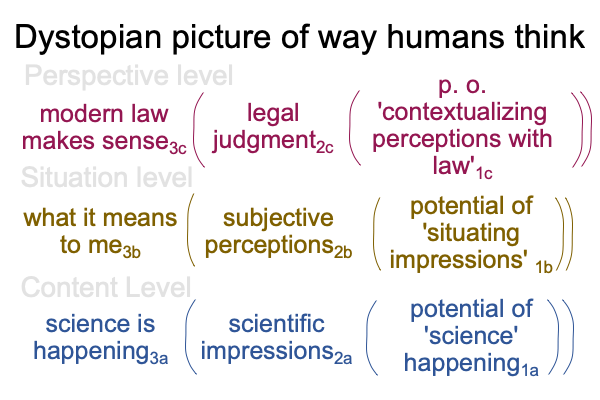Looking at Michael Tomasello’s Book (2014) “A Natural History of Human Thinking” (Part 21 of 22)
0376 In the era of collective intentionality, a common ground3c brings every social circle into harmony. Collective intentionality1c enters into every social circle. Diverse social circles prove adaptive in the proximate niches of intergroup competition, migration and settlement into novel environments and ecologies, and surviving the chaotic and often harsh weather regimes of the Pleistocene.
In the time of Homo sapiens, in the Lebenswelt that we evolved in, hand-speech talk opens cognitive spaces that bring constrained social complexity to the verge of differentiating the social, the organizational and the individual. But, the iconic and indexal nature of hand talk constrains differentiation, even as the symbolic nature of speech would release the Lebenswelt into unconstrained complexity.
0377 Indeed, the loss of the hand-talk component of hand-speech talk marks the end of the era of collective intentionalityand the start of the first singularity.
0378 Tomasello concludes his chapter on collective intentionality with a note on objectivity. The objective view is the view from “nowhere”. The objective viewpoint rises above both joint and collective intentionality. At least, that is the promise. Objectivity differentiates what joint and collective intentionality sense, but cannot articulate.
In our current Lebenswelt of speech-alone talk, a spoken word can become as objective as a surgeon’s blade. A spoken word can become as objective as a machete. A spoken word can become as objective as a cutting remark. Spoken wordsare purely symbolic beings. They cannot picture or point to their referents.
So, the modern use of the word, “objective”, means cut off from any subjective point of view.
0379 In the late-modern civilizations of the West, a written law is considered objective. It stands above and contains each and every one of us. Similarly, scientific facts and theories are supposed to be objective, because they stand below each and every one of us.
0380 Tomasello give this reader the impression that “objectivity” is one of the benefits of our current Lebenswelt.
0381 But, I wonder.
If I place an “objective” written law2c above my “subjective” perceptions2b, and if I insist that my “subjective” perceptions2b must be underwritten by scientific impressions2a, then I arrive at a dystopian picture of the way humans think.
0382 Here is the interscope.

Is this the natural end of human thinking?
